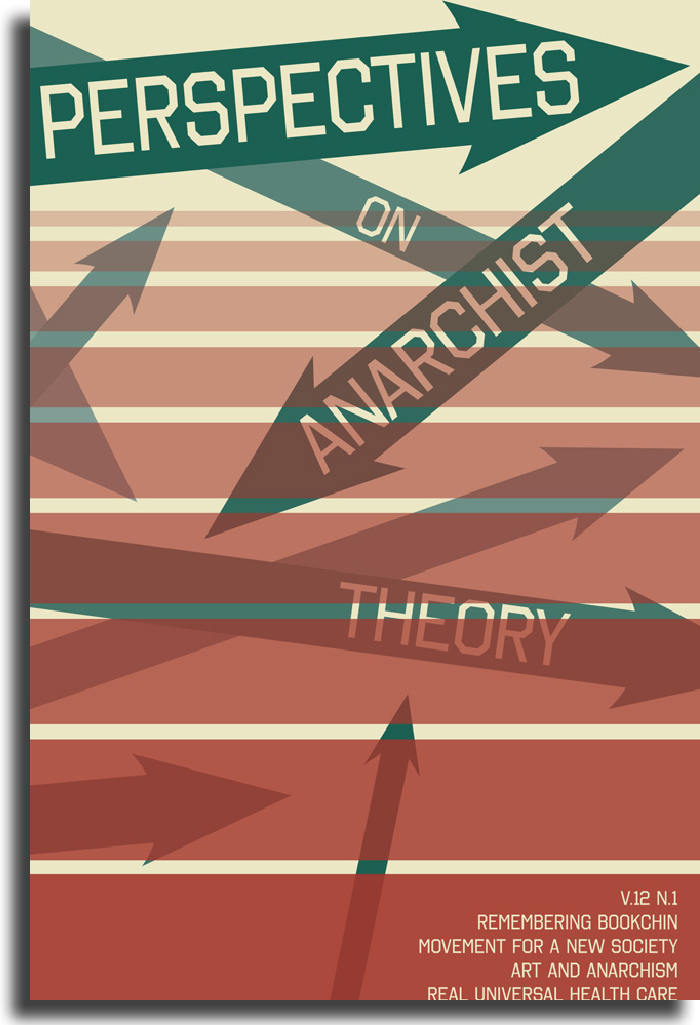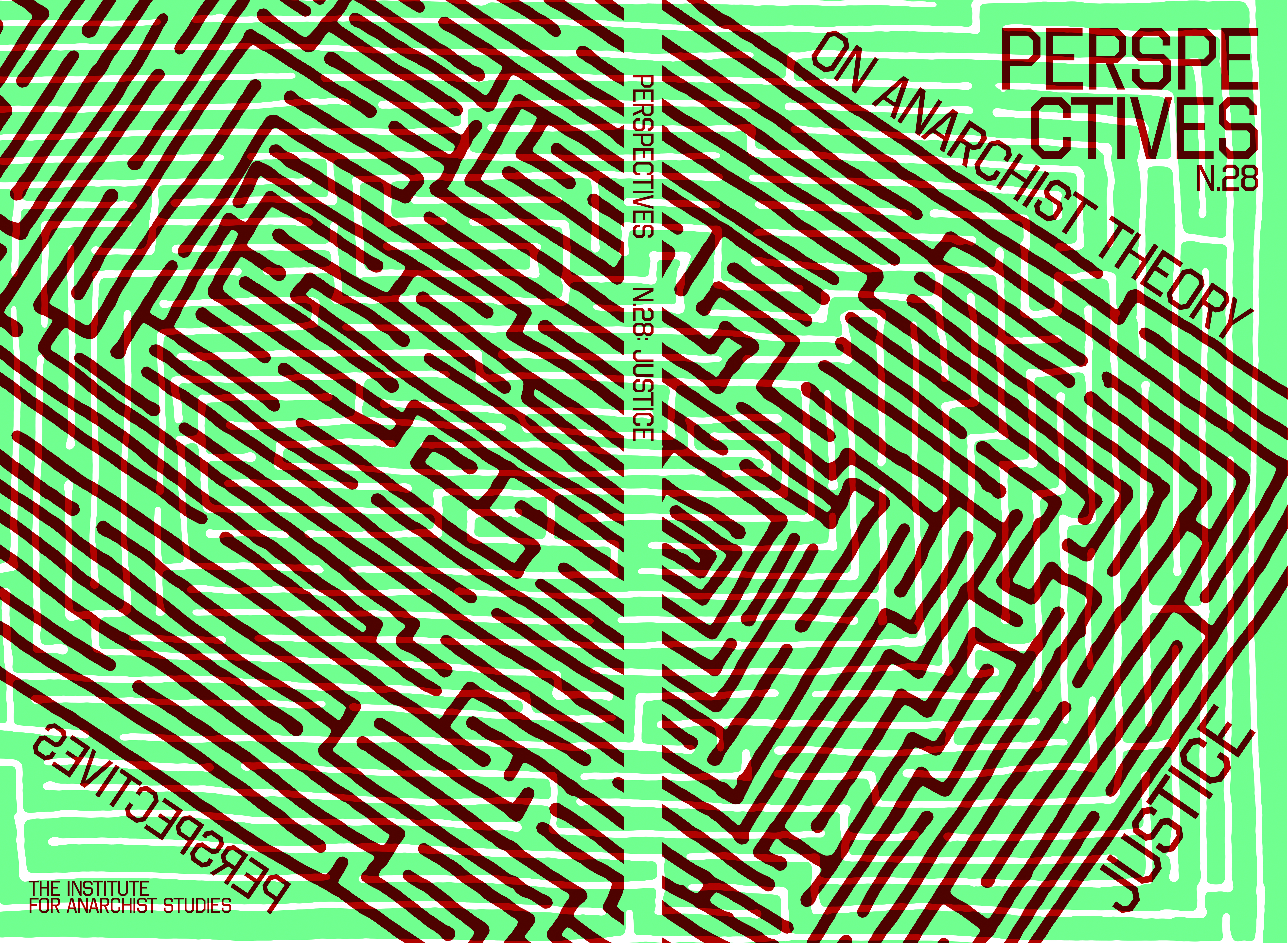This is an excerpt of a piece Josh MacPhee wrote for the Justseeds Artists’ Cooperative blog “Behind Design.” In it he describes the thought and work that went into the current cover art for Perspectives on Anarchist Theory.
I wanna show what went into the creation of the cover design for the new issue of Perspectives on Anarchist Theory, which went on sale in the Justseeds store this week. Perspectives started out a simple 4-8 page newsletter for the Institute for Anarchist Studies (IAS) almost twenty years ago. Twelve years ago it merged with the publication The New Formulation: An Anti-Authoritarian Review of Books to become a traditional magazine-sized (8.5″ x 11″) publication, running 48-60 pages per issue. This format stuck for a couple years, then their were multiple single-issue attempts to convert it into a journal-sized format. I joined the board of directors of the IAS in 2009, and it was decided to relaunch it once again as a journal, but this time to have an editorial board that was connected to, but not the same as, the board of directors of the IAS. I took over design duties, and Perspectives v.12 n.1 was the first issue I did the cover for. It quickly sold out, and it was decided that this was the format we were going to stick with.

#AKPress
A War of All Against All: A Review of Taking Sides: Revolutionary Solidarity and the Poverty of Liberalism, Cindy Milstein, ed. (Oakland: AK Press, 2015), by Arun Gupta
In the introduction to the book Taking Sides, the editor extends “an invitation to constructively debate the many thorny questions for which none of us have the answers.” In that spirit, and viewing our publication as a forum for vigorous and open debate, Perspectives presents the following review, and has specifically invited the book’s editor to respond in our pages. We also encourage you to join the discussion. We want to host debate and constructive engagement with the important issues that Taking Sides raises in our comments section. You can participate by leaving a reply at the bottom of the review. – Eds.
It was in a dusty lot in a residential corner of Albuquerque, New Mexico where Amalia’s story came spilling out.1 “This is the earliest memory of my mother,” she said, her eyes locked on a row of greens pushing through sandy soil under an open-faced hoop house. “I was less than two years old. She was picking a row of beets.” The last of ten children of Mexican and indigenous heritage in a family of farmworkers, Amalia says her mother was diagnosed with late-stage cancer while pregnant and given a few years to live.
“We were very poor and my mother felt I wouldn’t survive as a baby. My father worked constantly to feed our family and buy shoes for us once a year. My mother was friends with a white woman in a Jehovah’s Witness church who was married but couldn’t have children.” After her mother died the white couple adopted Amalia when she was still a toddler. “Right away they took me to a doctor because I was malnourished.”
“Then the woman who adopted me, a gracious and wonderful woman, was killed two years later in a car accident. So I lost my mom again.” Her adoptive father, Jack, became her primary caretaker. “He encouraged me as a woman to not let things limit me. He encouraged me to embrace my culture. He made relations with indigenous people in the area so he could take me to ceremonies. He really loved me.”
From Oblivion to Political Responsibility: An Anarchist Sister Reviews Dear Sister: Letters from Survivors of Sexual Violence (AK Press, 2014), reviewed by Sara Rahnoma-Galindo
This review appears in the new issue of Perspectives on Anarchist Theory, N.29, on the theme of anarcha-feminisms. It is available from AK Press here!
Radicals, including many anarchists, are involved in actively organizing against gender and sexual violence around the world. For example, Operation Anti-Sexual Harassment/Assault in Egypt; Las Kallejeras in the shantytowns of Santiago, Chile; the Colectiva de Gafas Violetas in Mexico; and countless other local initiatives all confront perpetrators in workplaces and organizing work. Yet, the task of addressing sexual violence, even in anarchist circles, continues to be singled out as primarily the job of survivors and their most immediate circles, instead of as a collective political responsibility. As an issue that we are socialized to meet with silence and stigmatization, sexual violence is commonly underemphasized or obscured amongst both radicals and society at large. Take for instance, ignorance of the fact that one out of three women in the world will be raped at some point in their lives. Or that, in the US, ninety-one percent of reported rape survivors are women, the most vulnerable being queer and gender nonconforming youth and people with physical disabilities, and fifteen percent of children are survivors of rape and incest. It is critical that our politics be aware of and address this. We need to be more diligent and active in both understanding sexual violence and linking it to radical organizing.

Consider reading Dear Sister: Letters from Survivors of Sexual Violence (AK Press, 2014), an anthology containing fifty insightful pieces, written by survivors from all walks of life, as part of this process. The book features an introduction by African-American incest and rape survivor and filmmaker Aishah Shahidah Simmons, and is edited by Philipina-American feminist author and survivor advocate Lisa Factora-Borchers. Known for having extensive involvement with survivors via coalition work, nonprofits, and institutions of higher education before piecing together Dear Sister, Lisa Factora-Borchers was first approached by Black feminist author Alexis Pauline Gumbs who asked her to write a letter of support to a friend who had just been raped. Not knowing the survivor’s situation, her name, or much else about her, Lisa Factora-Borchers nevertheless acknowledge the situation and communicated support. Hence the idea for the book was born.
Walidah Imarisha launches Angels with Dirty Faces in Portland!
Great turnout at Portland, Oregon’s Powell’s Books for the launch of Angels with Dirty Faces, new from the Institute for Anarchist Studies and AK Press. Get a copy here from AK!
CrimethInc. Reviews Perspectives on Anarchist Theory
Alanis, who does the podcast for CrimethInc. Ex-Workers’ Collective, with her partner in crime Clara, did a really thoughtful review of the current issue of Perspectives on Anarchist Theory (n.28) in their most recent broadcast. We excerpt it below, and provide links to the broadcast, the full transcript of the show, and to CrimethInc.’s website as well. Thanks comrades!
Perspectives on Anarchist Theory’s recent issue tackled the theme of “Justice” – quite a can of worms for the contemporary anarchist! The journal opens with a reflection on the theme written by the editorial collective, and quickly sets a thoughtful and inquisitive tone as it explores different dimensions of what justice might mean to anarchists in political, economic, ecological, and intra-movement or community contexts. It uses a series of rhetorical questions to prompt readers to examine our thoughts and values relating to justice without authority and the practical challenges posed by social oppression and reliance on state structures. While I sharply disagreed with their partial defense of certain principles of the US’s adversarial legal system, overall I found the introduction to be highly thought-provoking, and an excellent lens through which to read the forthcoming pieces.

Field Notes From an Archipelago: A Review of Grabbing Back: Essays Against the Global Land Grab (AK Press, 2014), edited by Alexander Reid Ross, by Will Munger
A land and water grab is happening in the canyons and plateaus where I live in rural Utah. Several Canadian corporations backed by transnational investors are moving in to extract tar sands and oil shale on public lands. These outfits are the spear tips of a host of operators who are trying to strip mine the world’s dirtiest oil in the headwaters of the Colorado River, one of North America’s most endangered rivers.
In a region already hit by more than a decade of drought, the mining corporations are drilling deep into underground aquifers to pump water for their processing operations. At the ranch where I work, the springs in the canyon downstream from the initial mine are drying up. The ranching family is one of the first to be impacted by the mine, but there are bigger implications, as waste discharged from the mines will impact more than 30 million people who rely on the Colorado River for drinking water and irrigation.
And then there are the climate change consequences. According to industry backers, there are more potential fossil fuels in the Green River formation that stretches across Utah, Wyoming, and Colorado than the Alberta tar sands. If the infrastructure for these types of megaprojects is completed, there is an almost certainty of being locked in a path toward catastrophic climate change.
 With these stunning contradictions in mind, and with all legal options exhausted, local people and climate justice rebels took matters into their own hands in the summer of 2014 by establishing a resistance camp on the mine lease in order to halt mining operations. Amidst a summer of blockades, police repression, and the stresses of day-to-day rural resistance, it’s been a challenge to maintain a global perspective. It’s clear that our fight is being driven by capital and technical knowledge generated through the exploitation of the Alberta tar sands. It’s also clear that there are financiers intending to export these mining operations around the world using corporations deeply tied to the military industrial complex.
With these stunning contradictions in mind, and with all legal options exhausted, local people and climate justice rebels took matters into their own hands in the summer of 2014 by establishing a resistance camp on the mine lease in order to halt mining operations. Amidst a summer of blockades, police repression, and the stresses of day-to-day rural resistance, it’s been a challenge to maintain a global perspective. It’s clear that our fight is being driven by capital and technical knowledge generated through the exploitation of the Alberta tar sands. It’s also clear that there are financiers intending to export these mining operations around the world using corporations deeply tied to the military industrial complex.
But what are the strategic and tactical implications as to how we should carry out our struggle? What are our relationships and responsibilities to other communities fighting exploitative land grabs around the world? How can we use our collective power to fundamentally transform the political and economic structures that facilitate this ecocidal rush?
While thinking through these questions, I came across a copy of Grabbing Back: Essays Against the Global Land Grab. This compilation is billed as an “illustrative field guide to the way people power responds to the global land grab.” It ranges from pieces written by voices new to me, like Yangtze River Delta Earth First!, to long time writers and movement elders, like Grace Lee Boggs, Max Rameau, Vandana Shiva, Noam Chomsky, and Silvia Federici.
Read an excerpt of the new IAS/AK Press book, Angels with Dirty Faces!
Our comrades at AK Press, with whom we just published Walidah Imarisha’s Angels with Dirty Faces: Three Stories of Crime, Prison, and Redemption, have posted an excerpt. Check it out here!

